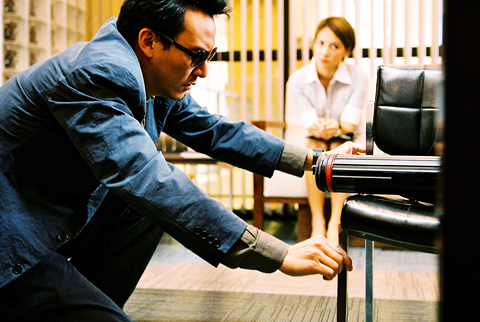The seabed stone formations discovered in the 1980s off Japan's Yonaguni Island, 111km directly east of Taiwan, have aroused controversy. Are they, as some theorists from the Morien Institute claim, the remains of an ancient culture? Or simply the work of natural processes? For filmmaker Tsui Hark (徐克), the mysterious structures provide a backdrop for Missing (謎屍), a romantic thriller starring Lee Sin-je (李心潔).
Despite a big-name cast, star director and enigmatic setting, the film suffers from a flabby storyline and vacillates unconvincingly between the romance and horror genres.
Lee plays Gao Jing, a psychologist living in Hong Kong who hits it off with underwater photographer Dave Chen (played by China's Guo Xiaodong, 郭曉冬).

PHOTO COURTESY OF STAR GROUP
Romance ensues, and Chen takes Gao on a diving trip to visit Yonaguni Island where he plans to propose to his true love.
But tragedy strikes on a dive when Chen loses his head. Literally.
Heartbroken and traumatized, Gao turns to hypnotherapy to retrieve the buried memories of what actually happened during the fateful dive.

PHOTO COURTESY OF STAR GROUP
Meanwhile, Chen's younger sister, Xiao Kai (Isabella Leong, 梁洛施), returns from Taiwan carrying a human head that she believes to be her deceased brother's and becomes possessed.
Gao's life spirals out of control when one of her patients, Simon (Chang Chen), convinces her of the existence of spirits. The psychologist finds it increasingly difficult to tell the difference between drug-induced visions, apparitions or illusions, as did this reviewer.
Missing opens with a promising premise but rapidly descends into convoluted plot devices with few genuine moments of horror, preventing viewers from suspending disbelief. There are unconvincing spirits, half-baked characters and an overwrought love story. Missing's end credits roll several anticlimaxes too late.
Taiwanese actor Chang Chen is one of the film's few pleasant surprises as he takes a break from his usual reticent leads to play an amusingly wacky sidekick.
Lee Sin-je, on the other hand, doesn't deviate from her usual scream queen expressions, and the deadpan Chang Chen-yue (張震嶽), who plays a marine archeologist, could have been left on the editing room floor without affecting the film's overall appeal.
Inspired by a documentary about the ancient underwater structures, Tsui reportedly spent three years and NT$300 million on Missing, which required advanced underwater cinematography equipment as well as a highly trained production team capable of underwater filmmaking. Though the effort involved is commendable, the results are not, which means the behind-the-scenes story of how the movie was filmed could be more enjoyable than the film itself.

Towering high above Taiwan’s capital city at 508 meters, Taipei 101 dominates the skyline. The earthquake-proof skyscraper of steel and glass has captured the imagination of professional rock climber Alex Honnold for more than a decade. Tomorrow morning, he will climb it in his signature free solo style — without ropes or protective equipment. And Netflix will broadcast it — live. The event’s announcement has drawn both excitement and trepidation, as well as some concerns over the ethical implications of attempting such a high-risk endeavor on live broadcast. Many have questioned Honnold’s desire to continues his free-solo climbs now that he’s a

Lines between cop and criminal get murky in Joe Carnahan’s The Rip, a crime thriller set across one foggy Miami night, starring Matt Damon and Ben Affleck. Damon and Affleck, of course, are so closely associated with Boston — most recently they produced the 2024 heist movie The Instigators there — that a detour to South Florida puts them, a little awkwardly, in an entirely different movie landscape. This is Miami Vice territory or Elmore Leonard Land, not Southie or The Town. In The Rip, they play Miami narcotics officers who come upon a cartel stash house that Lt. Dane Dumars (Damon)

Francis William White, an Englishman who late in the 1860s served as Commissioner of the Imperial Customs Service in Tainan, published the tale of a jaunt he took one winter in 1868: A visit to the interior of south Formosa (1870). White’s journey took him into the mountains, where he mused on the difficult terrain and the ease with which his little group could be ambushed in the crags and dense vegetation. At one point he stays at the house of a local near a stream on the border of indigenous territory: “Their matchlocks, which were kept in excellent order,

Today Taiwanese accept as legitimate government control of many aspects of land use. That legitimacy hides in plain sight the way the system of authoritarian land grabs that favored big firms in the developmentalist era has given way to a government land grab system that favors big developers in the modern democratic era. Articles 142 and 143 of the Republic of China (ROC) Constitution form the basis of that control. They incorporate the thinking of Sun Yat-sen (孫逸仙) in considering the problems of land in China. Article 143 states: “All land within the territory of the Republic of China shall